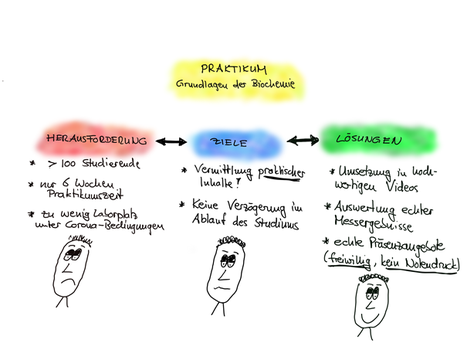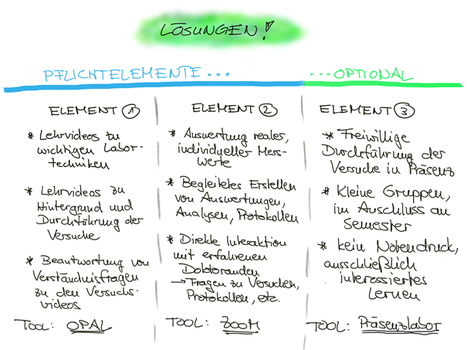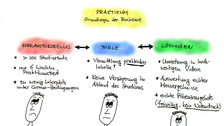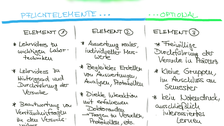Praktikum Grundlagen der Biochemie: Prof. Dr. Tobias Gulder (#TG1)
Format
- Lehrvideos und Datenaustausch über Opal (asynchron, online)
- Persönliche Interaktion über Zoom-Videokonferenzen (synchron, online)
- Echtes Präsenzangebot zusätzlich optional (Präsenz, ohne Prüfungsdruck)
Schlagworte
Hybrid-Praktikum; Biochemie; Proteine und Enzyme; Biomolekulare Laborgrundtechniken

© • Prof. Dr. Tobias Gulder

© • Prof. Dr. Tobias Gulder
Beschreibung
Einer der wichtigsten Aspekte der universitären Ausbildung von Naturwissenschaftler:innen ist das Vermitteln praktischer Fähigkeiten im Rahmen von Laborpraktika. Die Durchführung von Praktika unter Corona-Bedingungen ist gleichzeitig die wohl größte Herausforderung der letzten Semester. Dies gilt insbesondere für Praktika, die in dicht gepackte Stundenpläne eingebaut sind, wo also eine Verlängerung des Praktikumszeitraums und dadurch die zeitlich gestreckte Durchführung der Praktika in kleineren Gruppen nicht möglich ist. Diesem Problem sahen wir uns im Praktikum Grundlagen der Biochemie ausgesetzt, eine Veranstaltung mit mehr als 100 Studierenden, für die im Studienablaufplan lediglich 6 Wochen reserviert sind. Gesucht wurde nach einer Lösung, die die Durchführung des Praktikums in diesem Zeitraum ermöglicht, die Vermittlung der wichtigen praktischen Inhalte möglichst gut umsetzt und vor allem allen Studierenden den Abschluss des Praktikums ermöglicht und so zu keiner Verzögerung im Studienablauf führt.
Gelöst wurden diese Herausforderungen durch Aufbau eines Hybridpraktikums mit drei Elementen. Im ersten Element wurden mit Hilfe von über OPAL zur Verfügung gestellten Lehrvideos sowohl wichtige Labortechniken (z.B. Pipettieren, Autoklavieren, Zentrifugieren, Herstellen von Puffern, etc.) als auch alle Versuchshintergründe und Versuchsdurchführungen des Praktikums vermittelt. Das neu erlernte Wissen wurde durch Fragen zu allen Lehrvideos vertieft. In Element 2 wurden den Studierenden reale, individuelle Messwerte zu den einzelnen Versuchen übermittelt, die es jedem Praktikumsteilnehmer erlaubten, detaillierte Auswertung und Analysen vorzunehmen und diese in Protokollen schriftlich darzustellen. Hier erfolgte intensive Interaktion mit erfahrenen Promovierenden mittels Online-Konferenzen, über die die Studierenden alle offenen Fragen zu den Versuchen, den Protokollen und Auswertungen stellen und in direkter Diskussion erläutern konnten. Mit erfolgreichem Abschluss dieser beiden Elemente konnten die Studierenden das Modul problemlos im laufenden Semester abschließen. Darüber hinaus wurde noch ein drittes, freiwilliges Element angeboten: im Anschluss an das Modul wurde es interessierten Studierenden ermöglicht, in kleinen Gruppen die erlernten Versuche auch in Präsenz durchzuführen. Dies war dann entkoppelt von den straffen Semesterablaufplänen z. B. innerhalb der Semesterferien möglich – ohne Zeit- und Notendruck.
Mit dem hier aufgezeigten Praktikum in Hybridformat gelang es uns den Bedürfnissen aller Studierenden gerecht zu werden – von zügigem Studienfortschritt bis hinzu detailliertem Praxiswissen.
Beispielvideos
(1) Beispielkurzvideos zu grundlegenden Labortechniken und -Geräten:
- Anleitung Pipettieren: https://tud.link/us7m
- Anleitung Spektrometer: https://tud.link/desv
(2) Beispielkurzvideos zu ausgewählten Versuchen:
- Versuch Gelelektrophorese: https://tud.link/0j61
- Versuch Enzymkinetik: https://tud.link/7t2s
Ansprechpartner
Prof. Dr. Tobias Gulder
Dr. Hülya Aldemir
Manuel Einsiedler
Abstimmungskennung
#TG1


